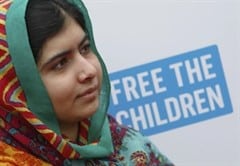
The Nobel Peace Prize is required by Alfred Nobel’s will, which created it, to go to “the person who shall have done the most or the best work for fraternity between nations, for the abolition or reduction of standing armies and for the holding and promotion of peace congresses.” The Nobel Committee insists on awarding the prize to either a leading maker of war or a person who has done some good work in an area other than peace.
The 2014 prize has been awarded to Kailash Satyarthi and Malala Yousafzay, which is not a person but two people, and they have not worked for fraternity between nations or the abolition or reduction of standing armies but for the rights of children. If the peace prize is to be a prize for random good works, then there is no reason not to give it to leading advocates for the rights of children. This is a big step up from giving it to leading makers of war. But then what of the prize for peace and the mission of ending war that Nobel included in his will in fulfillment of a promise to Bertha von Suttner?
Malala Yousafzay became a celebrity in Western media because she was a victim of designated enemies of Western empire. Had she been a victim of the governments of Saudi Arabia or Israel or any other kingdom or dictatorship being used by Western governments, we would not have heard so much about her suffering and her noble work. Were she primarily an advocate for the children being traumatized by drone strikes in Yemen or Pakistan, she’d be virtually unknown to U.S. television audiences.
But Malala recounted her meeting with U.S. President Barack Obama a year ago and said, “I also expressed my concerns that drone attacks are fueling terrorism. Innocent victims are killed in these acts, and they lead to resentment among the Pakistani people. If we refocus efforts on education, it will make a big impact.” So, she actually advocated pursuing education rather than war, and yet the Nobel Committee had not a word to say about that in announcing its selection, focusing on eliminating child labor rather than on eliminating war. The possibility exists then that either of this year’s recipients might give an antiwar acceptance speech. There has, after all, only been one pro-war acceptance speech, and that was from President Obama. But many speeches have been unrelated to abolishing war.
Fredrik S. Heffermehl, who has led efforts to compel the Nobel Committee to give the peace prize for peace, said on Friday:
Malala Yousafzay is a courageous, bright and impressive person. Education for girls is important and child labor a horrible problem. Worthy causes, but the committee once again makes a false pretense of loyalty to Nobel and confuses and conceals the plan for world peace that Nobel intended to support.
If they had wished to be loyal to Nobel they would have stressed that Malala often has spoken out against weapons and military with a fine understanding of how ordinary people suffer from militarism. Young people see this more clearly than the grown ups.
The leading contenders for this year’s prize, as speculated in the media, included the Pope who has in fact spoken against all war, abandoning the “just war” idea; and some advocate or other for Japan’s Article Nine which forbids war and ought to be a model for other nations but is being threatened in Japan instead. These recipients would at least have bordered on Nobel’s ideal, as perhaps might be said for last year’s recipient, the Organisation for the Prohibition of Chemical Weapons.
Also on the list was a Russian newspaper supportive of Western aggression, the President of Uruguay for legalizing marijuana, Edward Snowden for leaking evidence of U.S. spying, Denis Mukwege for helping victims of sexual violence, and Chelsea Manning for exposing U.S. war crimes. Manning would have made a certain amount of sense, and her work has probably gone some way toward discouraging war. The same might be said, to a lesser degree, of Snowden. But none of these fit the description in Nobel’s will. If the peace prize were actually awarded to a leading peace activist, at this point the world would be rather scandalized and scratch its collective head in wonderment at what the significance could be in that person’s work.
Look at this list of recent recipients of a prize meant for peace:
The European Union
Ellen Johnson Sirleaf, Leymah Gbowee and Tawakkol Karman
Liu Xiaobo
Barack H. Obama
Martti Ahtisaari
Intergovernmental Panel on Climate Change (IPCC) and Albert Arnold (Al) Gore Jr.
Muhammad Yunus and Grameen Bank
There you have the two leading makers of war in the world: Obama and the E.U. You have advocates for green energy and small loans and women’s rights and human rights. Martti Ahtisaari’s prize announcement actually quoted from Nobel’s will, but he himself supported NATO and Western militarism.
While good work in other areas can in fact contribute to peace, it is unlikely to do so in the absence of recognition of the goal of peace and of work directly aimed at abolishing war.
The National Priorities Project, a U.S. organization that actually works against militarism, was nominated this year, as no doubt were others relevant to the purpose for which the peace prize was created.
Reprinted with permission from War is a Crime blog.

